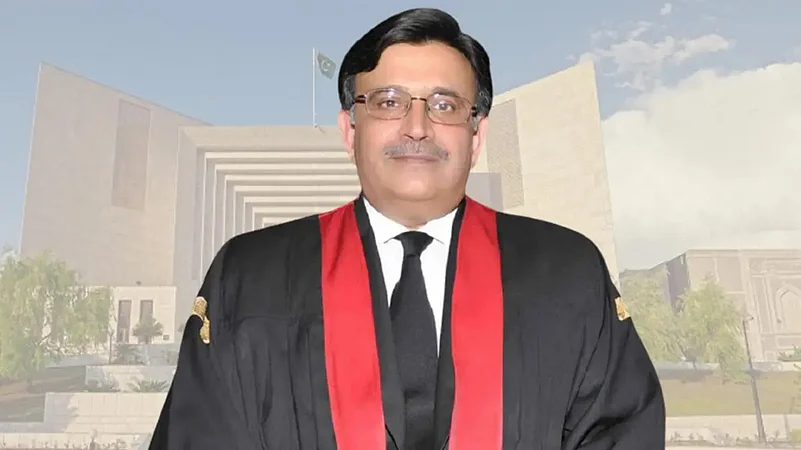Pakistan's Chief Justice Umar Ata Bandial on Thursday noted that National Assembly deputy speaker Qasim Suri's move to dismiss a no-confidence motion against embattled Prime Minister Imran Khan through a controversial ruling is, prima facie, a violation of Article 95 of the Constitution as he said the court will issue a decision in the high-profile case today.
Pak CJ Says Deputy Speaker's Ruling Prima Facie Violates Article 95, Decision To Be Issued Today
Chief Justice Bandial, who is heading a five-member bench comprising Justices Ijazul Ahsan, Mohammad Ali Mazhar Miankhel, Munib Akhtar and Jamal Khan Mandokhel, made the observation during the hearing on Thursday.

Chief Justice Bandial, who is heading a five-member bench comprising Justices Ijazul Ahsan, Mohammad Ali Mazhar Miankhel, Munib Akhtar and Jamal Khan Mandokhel, made the observation during the hearing on Thursday.
During the hearing on the fourth day, Chief Justice Bandial noted that deputy speaker's ruling is, prima facie, a violation of Article 95.
"The real question at hand is what happens next," he was quoted as saying by the Dawn newspaper.
"We have to look at national interest," he said, adding that the court would issue a verdict today.
Security was beefed up around the court premises in anticipation of the important verdict. Riot police were deployed outside the court.
Earlier, Barrister Ali Zafar, representing President Arif Alvi, presented his arguments.
Bandial questioned Zafar where the constitutional crisis in the country was, if everything was happening as per the Constitution, the report said.
The top judge also asked the counsel why he was not explaining whether or not there was a constitutional crisis in the country.
"If everything is happening according to the Constitution, where is the crisis?" the chief justice asked.
During the hearing, Zafar was asked by Justice Miankhel if the prime minister was the people's representative. The lawyer replied in the affirmative.
Miankhel then inquired if the premier would be protected if the Constitution was violated in Parliament.
At this, Zafar replied that the Constitution must be protected in accordance with the rules it underlines. He said that in order to protect the Constitution, each and every article had to be kept in mind.
Justice Bandial then asked what would happen when an injustice was carried out against the entire assembly, not just one member.
Justice Mandokhel pointed out that even though the deputy speaker Suri announced the April 3 ruling which dismissed the no-confidence motion against Prime Minister Khan, it was signed by Speaker Asad Qaiser.
He made the observation as Suri and Qaiser's lawyer, Naeem Bukhari, presented his arguments in the case concerning the legality of the deputy speaker's ruling, the Dawn newspaper reported.
Justice Mandokhel also pointed out that the minutes of the parliamentary committee meeting, which were submitted to court by Bukhari, didn't prove if the deputy speaker was present.
He asked whether the foreign minister was present during the parliamentary committee meeting, during which contents of the ‘threat letter’ were shared with parliamentarians, noting that his signature was not included in the record.
"Shouldn't the foreign minister have been present?" the judge asked, which prompted the lawyer to admit the minister should have been present.
Chief Justice Bandial pointed out that the name of the national security adviser at the time, Moeed Yusuf, was also not included in the record.
National Assembly Deputy Speaker Suri on Sunday ruled that the no-confidence motion was linked with the "foreign conspiracy" to topple the government and hence was not maintainable. Minutes later, President Alvi dissolved the National Assembly on the advice of Prime Minister Khan.
Chief Justice Bandial on Wednesday sought the minutes of the recent meeting of the National Security Council which had discussed a letter purportedly showing evidence of the "foreign conspiracy" to oust the PTI-led government
Attorney General Khalid Jawed Khan, who was the last to give his arguments on Thursday, told court that he would not be able to give details of the recent meeting of the National Security Committee in an open courtroom. He asserted that the court could issue an order without questioning anyone's loyalty.
He argued that the prime minister was the "biggest stakeholder" and, therefore, had the power to dissolve the assembly.
He also pointed out that the assembly would stand dissolved if the president did not make a decision on the prime minister's advice within 48 hours. He argued that voting on the no-confidence motion was not the fundamental right of a lawmaker.
During the hearing on Wednesday, the chief justice repeatedly reminded the lawyers to conclude their arguments at the earliest to let the bench issue an order.
The outcome will not only decide the fate of no-confidence but also the dissolution of the National Assembly and the upcoming elections.
If Khan gets a favourable ruling, elections will take place within 90 days. If the court rules against the deputy speaker, Parliament will reconvene and hold the no-confidence vote against Khan, experts said.?
-
Previous Story
Massive Brawl In Turkish Parliament, Blood On Floor As MPs Engage In Fistfight
- Next Story



















